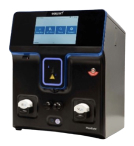Releases Details
Termination of DI Facility and Transition to CDI
Termination of depositary interest facility and transition to CREST depository interests
In connection with the Proposed Offering and planned Nasdaq dual-listing, the Company intends to appoint
In addition, in order to ensure ease of cross-border movements of shares between the
A summary of the anticipated timeline is as follows:
· Stock deposits and withdrawals disabled in CREST: close of business in the
· Termination of the existing DI facility: close of business in the
· CDIs enabled for settlement in CREST: expected during the trading day in the
This communication shall not constitute an offer to sell or the solicitation of an offer to buy any common stock or other securities of
About
MaxCyte Contacts:
|
|
+1 301-944-1660 |
|
Nominated Adviser and Joint Corporate Broker Panmure Gordon Corporate Broking |
+44 (0)20 7886 2500 |
|
Joint Corporate Broker
|
+44 (0)20 7260 1000 |
|
Joint Corporate Broker Healthcare Investment Banking Corporate Broking
|
+44 (0) 20 7710 7600
|
|
Financial PR Adviser
|
+44 (0)203 709 5700 |
|
US IR Adviser |
|
Appendix
Frequently Asked Questions
Part I - Questions and Answers relating to the issue of Common Stock in the Proposed Offering
Q: What is the security being issued in the Proposed Offering? Is it American Depositary Receipts (ADRs) or American Depositary Shares (ADSs)?
A: The security being issued in the Proposed Offering is common stock of the Company with nominal value of
Q: Will the Common Stock issued in the Proposed Offering be held in a restricted line?
A: The Common Stock issued in the Proposed Offering (the "New Common Stock") will not be held in a restricted line. The New Common Stock will be registered with the
Q: Will the New Common Stock issued in the Proposed Offering be admitted to trading on AIM?
A: The New Common Stock will be admitted to trading on AIM. It is expected that admission will be effective at
Q: If I buy New Common Stock in the Proposed Offering, can I elect to have it settled via Depositary Interests in CREST?
A: No, all purchases of New Common Stock in the Proposed Offering will be settled via
Part II - Questions and Answers relating to existing holdings of Common Stock
Q: Will the Common Stock currently in issue be listed on the Nasdaq Global Market?
A: The Common Stock will be traded on the Nasdaq Global Market. However, only the New Common Stock sold in the Proposed Offering (including the Common Stock issued on any exercise of the underwriters' over-allotment option) will be registered with the
The existing Common Stock in issue prior to the Proposed Offering trading on the unrestricted trading line MXCT and restricted trading line MXCN (the "Existing Common Stock") will continue to be "restricted securities" for US securities law purposes as that term is defined in Rule 144 under the Securities Act. These restricted securities are eligible for public sale in
Q: How will the Common Stock be held following the Proposed Offering?
A: Currently,
Prior to closing of the Proposed Offering, the Company's share register will be moved from
Q: What is the Direct Registration System (DRS)?
A: The DRS allows registered securities to be held in electronic form without having a physical share certificate issued as evidence of ownership. DRS has been used in the US market for over 10 years and is supported by the
DRS provides an attractive and convenient alternative to holding physical stock certificates. DRS statements can also be easily replaced if ever misplaced. DRS eliminates a Stockholder's risk of loss, theft or destruction of certificates, plus the time and expense to replace a lost certificate. It eliminates the cost of maintaining a secure place to keep stock certificates, makes stock transactions faster and easier and saves the Company unnecessary printing and mailing expenses.
Q: What will happen to the existing Depositary Interests in CREST as a result of the Proposed Offering?
A: In order to ensure ease of cross-border movements for Stockholders between the
All DIs in the DI Facility at the close of business in the
The CDIs are expected to be enabled for settlement in CREST during the trading day in the
Q: What are CREST Depository Interests (CDIs)?
A: A CDI is a security constituted under English law issued by the
Holding by way of a CDI will entail international custody costs and certain differences in the nature, range and cost of corporate services, including with respect to the manner in which voting rights can be exercised in person or by proxy, relative to a direct holding of Common Stock or a holding of DIs issued by the Depositary. The Company expects to enter into arrangements enabling it to send stockholder meeting materials to, and receive voting instructions from, holders of the CDIs. CREST members who anticipate continuing to hold their investment in Common Stock in CREST via CDI should familiarise themselves with the CDI service offering, details of which are included in the CREST International Manual and the terms of the CREST Deed Poll.
Q: I currently hold Existing Common Stock in the unrestricted line MXCT; can I trade my Existing Common Stock on the Nasdaq Global Market?
A: If a holder of Existing Common Stock in the unrestricted line MXCT wishes to sell their Existing Common Stock on the Nasdaq Global Market, the holder needs to use an eligible US brokerage firm and, in general, abide by Rule 144. We have included a summary of the requirements of Rule 144 (and Rule 701) in Part III of this document. However, Stockholders should obtain specific legal advice on their own position as needed.
Q: I currently hold Existing Common Stock in the unrestricted line MXCT in certificated form; how can I get my shares into DTC to be able to trade on the Nasdaq Global Market?
You will need to engage a US brokerage firm that is a DTC participant. Your US brokerage firm may require a copy of your DRS statement and will then initiate the transfer and deposit of your shares into DTC. For further information, please contact your nominated US brokerage firm, who will also be able to advise you of any charges and timings for completion.
Q: I currently hold Existing Common Stock in the unrestricted line MXCT in CREST in the form of Depositary Interests; how can I get my shares into DTC to be able to trade on the Nasdaq Global Market?
A: You will need to engage a US brokerage firm that is a DTC participant. You will need to request the cancellation of the CDIs (which will replace the DIs held as at the DI Facility Termination Date) and the release of the underlying Existing Common Stock from the DTC participant account of the CREST Nominee to the DTC account of your US broker in accordance with
Q: What happens to Existing Common Stock held in the restricted line MXCN?
A: The Company also has a restricted line of stock under the symbol MXCN that was issued in
Following the expiration of the distribution compliance period, the Existing Common Stock currently held in the restricted line MXCN will be transferred to the unrestricted line MXCT and will be able to be transferred into DTC as set out under the question "I currently hold Existing Common Stock in the unrestricted line MXCT in certificated form; how can I get my shares into DTC to be able to trade on the Nasdaq Global Market?". Thereafter, if holders wish to hold such Existing Common Stock in CREST, the Existing Common Stock could be transferred to the CREST Nominee within the DTC system to enable the issue of CDIs representing the relevant Common Stock.
Q: Will it be possible to move Common Stock between the US and
A: Yes, it is anticipated that cross-border movements between the
For assistance, including details of any charges or timings, please contact your current brokerage firm/nominee.
Part III - Summary of the requirements of Rule 144 and Rule 701
Rule 144
In general, under Rule 144 as currently in effect, once the Company has been subject to public company reporting requirements of Section 13 or 15(d) of the US Securities Exchange Act of 1934 (the "Exchange Act") for at least 90 days, an eligible stockholder is entitled to sell such shares without complying with the manner of sale, volume limitation or notice provisions of Rule 144, subject to compliance with the public information requirements of Rule 144. To be an eligible stockholder under Rule 144, such stockholder must not be deemed to have been an affiliate of the Company for purposes of the Securities Act at any time during the 90 days preceding a sale and must have beneficially owned the shares proposed to be sold for at least six months, including the holding period of any prior owner other than the Company's affiliates. If such a person has beneficially owned the shares proposed to be sold for at least one year, including the holding period of any prior owner other than the Company's affiliates, then such person is entitled to sell such shares without complying with any of the requirements of Rule 144, subject to the expiration of the lock-up agreements described below.
In general, under Rule 144, as currently in effect, our affiliates or persons selling shares on behalf of the Company's affiliates are entitled to sell shares on expiration of the lock-up agreements entered into in connection with the Proposed Offering, subject, in the case of restricted securities, to such shares having been beneficially owned for at least six months. Beginning 90 days after the date of the final prospectus for the Proposed Offering, within any three-month period, such stockholders may sell a number of shares that does not exceed the greater of:
· 1% of the Common Stock then outstanding or
· the average weekly trading volume of the Common Stock on the Nasdaq Global Market during the four calendar weeks preceding the filing of a notice on Form 144 with respect to such sale.
Sales under Rule 144 by the Company's affiliates or persons selling shares on behalf of the Company's affiliates are also subject to certain manner of sale provisions and notice requirements and to the availability of current public information about the Company.
Rule 701
Rule 701 generally allows a stockholder who was issued shares under a written compensatory plan or contract and who is not deemed to have been an affiliate of the Company during the immediately preceding 90 days, to sell these shares in reliance on Rule 144, but without being required to comply with the public information, holding period, volume limitation or notice provisions of Rule 144.
Rule 701 also permits affiliates of the Company to sell their Rule 701 shares under Rule 144 without complying with the holding period requirements of Rule 144. All holders of Rule 701 shares, however, are required by that rule to wait until 90 days after the date of the final prospectus in respect of the Proposed Offering before selling those shares under Rule 701, subject to the expiration of the lock-up agreements entered into in connection with the Proposed Offering.
RNS may use your IP address to confirm compliance with the terms and conditions, to analyse how you engage with the information contained in this communication, and to share such analysis on an anonymised basis with others as part of our commercial services. For further information about how RNS and the





